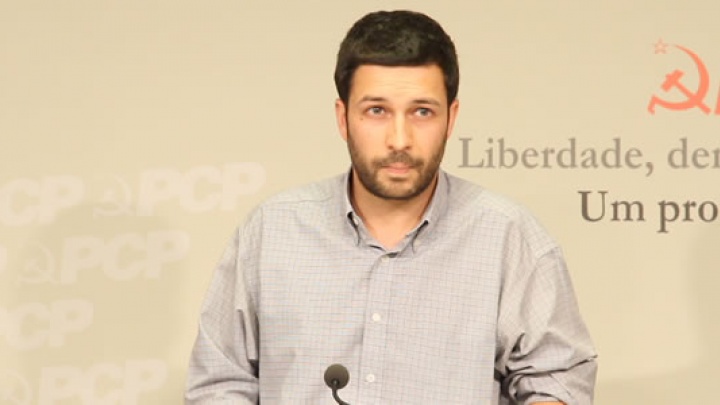Statement by João Ferreira, Member of the European Parliament
Coerced by the disaster into which Greece has been led and into which other European countries (including Portugal) are being cornered – in addition to the risk of default spreading to Italy and Spain – yesterday's Extraordinary Summit of eurozone Heads of State and Government took decisions that are yet one more grave step toward limiting States' sovereignty and also a response that guarantees the interests of finance capital and of Europe's major powers. These decisions are a factor that worsens our country's situation and limits its development and progress.
1. The decisions adopted amount to a confession that the PCP's proposals to renegotiate the debt (repeatedly and irresponsibly rejected by the PSD, CDS and PS parties) are an inevitable process. This covert “renegotiation” has exposed the fact that debt renegotiation is not only possible, it is inevitable – although this has been systematically denied. However, the substance and terms of the decisions taken are not the change needed to address European workers' and peoples' problems. On the contrary, they insist on a path of social retrogression and economic decline.
2. Lower interest rates and longer repayment times for Portugal while maintaining the package of political choices contained in the programme of aggression and submission to the EU and IMF accepted by PS, PSD and CDS, is an admission that the terms previously agreed are impossible to implement (as the PCP warned from the outset). Overall, they are a way to promote the continued plunder of our national resources while intensifying exploitation and jeopardising Portugal's future.
3. Contrary to what is really needed and the PCP proposes – a public debt renegotiation with new due dates, interest rates and amounts, freed from the brutal conditions imposed by the [EU-IMF-ECB] troika – the measures that have been announced imply that Portugal will continue to have its resources plundered, and that the Portuguese people will undergo enormous sacrifices.
According to yesterday's renegotiated conditions, Portugal will be paying 3.5% annual interest for 15 years on the loan that has already been contracted with the EU and IMF. This means that instead of the 30.4 thousand million euros that Portugal would have to pay as interest, it will now have to pay 40.95 thousand million by the new due dates. While this decision lowers the annual amount to be paid as interest in the coming years, it means Portugal will now have to pay 10 thousand million euros more interest overall, by draining the nation's resources and increasing exploitation, to service a debt that – given the long-term economic recession it is suffering – is not only unacceptable, but will turn out to be unpayable.
4. The PCP alerts to the fact that – contrary to the PSD/CDS government's attempts to deceive Portugal's people as to the meaning of these decisions – what it is really preparing to implement with PS support in the next few months is the set of measures contained in their agreement with the EU/IMF: easier and cheaper dismissals; cuts in salaries and pensions; theft in the 13th month [Christmas bonus]; price rises in energy, pharmaceuticals and transportation; privatisation of strategic public sectors and companies; direct funneling of millions of euros from the State to the banks. All of this amounts to further accumulation and concentration of capital by economic and financial conglomerates, and guarantees creditors' interests – at the expense of people's living standards and of economic activity itself.
5. The PCP points out how revealing all this is about who really runs the European Union and whose interests the EU serves: the Extraordinary Summit of eurozone Heads of State and Government was preceded by a meeting between Merkel and Sarkozy with the formal participation of representatives of finance capital and the EU's major banks. Accordingly, the European Financial Stabilisation Fund's decision to enable it to directly buy States' debt on the so-called secondary market will in practice amount to a transfer of public debt currently held by banks onto the backs of Europe's peoples.
Just as serious are the new steps taken toward the creation of veritable protectorates within the EU itself, and toward new forms of economic colonisation. It is an unacceptable and dangerous interference to have given supra-national structures the power to directly manage the EU structural funds allocated to Greece.
6. The PCP reasserts that the current situation is indissociable from the nature of capitalism and from the EU and Euro capitalist integration processes – about whose consequences the PCP repeatedly alerted. The backdrop against which this Eurozone Meeting was held proves beyond all doubt that the process of concentration and centralisation of economic and political power initiated to allegedly combat the crisis, the policies underlying “economic governance” and the “Euro-Plus Pact” and the so-called economic bailout packages, have not only not solved any of the Eurozone's economic and financial problems, they have made these problems much worse. Their devastating consequences are there for all to see, and they are not confined to the countries targeted by foreign interference, thus confirming that this crisis is systemic, and indissociable from the deepening of capitalism's structural crisis.
7. Independently of a detailed analysis of the measures taken at this meeting, what is most prominent and obvious is a structural inability to address the crisis and overcome the deepening contradictions. The nature and choices inherent in the way the EU has reacted to this crisis are themselves – as the PCP has repeatedly stated – seeds of future deeper crises.
No matter how much Portugal's government and the European Union's power may want to hide it, what is required to address the extremely serious problems that exist is: an end to liberalised capital movements and to tax havens; an effective fight against speculation; a lower ECB reference rate; an end to secondary markets and their speculative securities; changed goals and mode of operation for the ECB; replacement of the Stability Pact with an employment and economic development programme; a courageous and responsible approach to the euro's and EMU's future; a thorough revision of the EU's economic policies with a view to solving the common problems of several member states by relying on the development of their productive systems, with a quick-acting and robust strategy to create jobs and increase workers' and peoples' purchasing power.
While calling upon Portugal's workers and people to step up the struggle, the PCP reiterates that a real solution to the current crisis lies in questioning the European Union's current direction and Treaties, and in making a full about-turn in EU economic and social policies. The PCP considers that real debt renegotiation, rejection of the measures contained in the foreign intervention and aggression programme, defence of Portuguese workers' and people's rights and enhancement of national production, are – as part of a patriotic and left-wing policy – the only alternative capable of averting disaster and asserting a sovereign route toward development and social progress.
Lisbon, 22 July 2011




